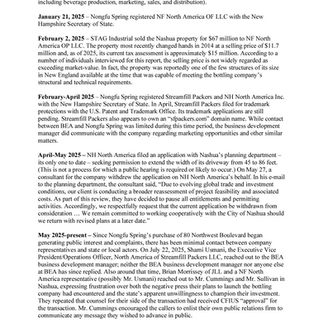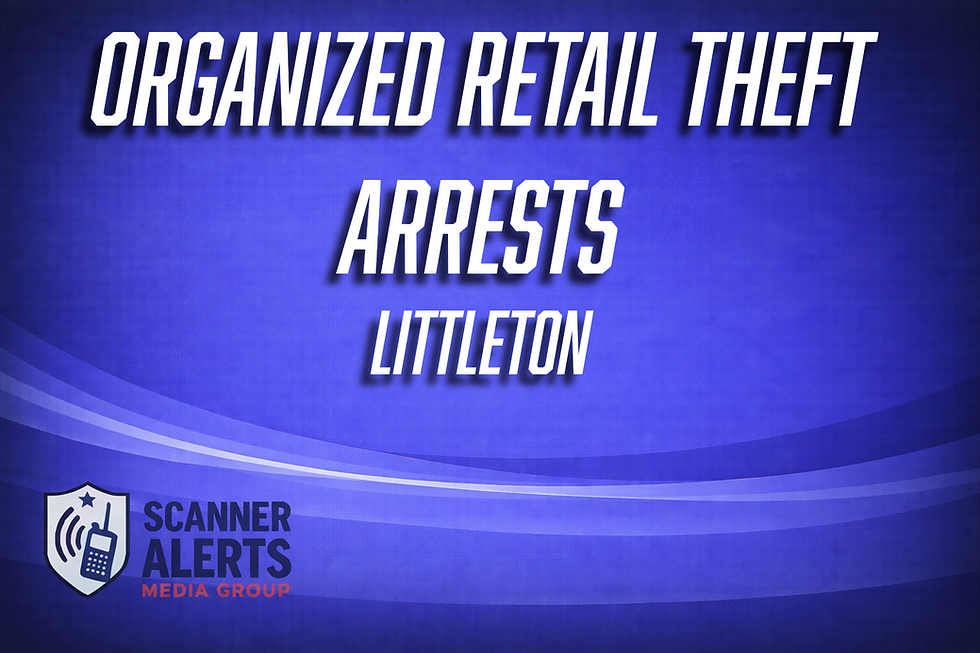NH DOJ Releases Memo Detailing Nongfu Spring’s Nashua Property Purchase
- Scanner Alerts Media

- Oct 6, 2025
- 4 min read
October 6, 2025
By: Scanner Alerts Media Group
New Hampshire’s Department of Justice has released a detailed memo requested by Governor Kelly Ayotte, outlining what state and local officials knew—and when—about a beverage company’s purchase of a large industrial building in Nashua. The Governor waived attorney-client and executive privileges to make the review public, and the document focuses on facts, timelines, and agency roles rather than policy judgments.
The DOJ memo explains it was prepared to examine the facts and circumstances surrounding the early-2025 purchase of 80 Northwest Boulevard by a U.S. subsidiary of Nongfu Spring. It also answers questions raised by Executive Councilors about the Department of Business and Economic Affairs’ (BEA) involvement and summarizes interviews with BEA, the City of Nashua, and Pennichuck Corporation, the city’s water utility.
Key timeline
March–June 2024: Cushman & Wakefield asked BEA’s business development manager to help identify New Hampshire sites for a bottling investment. By May–June, BEA learned STAG Industrial owned a 375,000-plus square-foot building at 80 Northwest Boulevard and coordinated an early-stage vetting visit with city officials.
June 17, 2024: Representatives of Nongfu Spring—including Chairman Zhong Shanshan—toured the Nashua facility alongside local utilities, including city-owned Pennichuck.
November–December 2024: Technical meetings at Pennichuck and on site examined engineering, gas, fire preparedness, sewer, and building needs for a tea and beverage bottling operation. Counsel stated the firm was handling the CFIUS aspect of the transaction.
Late 2024–Early 2025: Nongfu formed three Delaware companies—NF North America OP LLC (real estate), Streamfill Packers LLC (manufacturing/sales), and NF North America, Inc. (broader commercial purposes)—and began registering them in New Hampshire.
February 2, 2025: STAG Industrial sold the property to NF North America OP LLC for $67 million. Interviews indicated the price was not widely seen as above market given the scarcity of buildings of this size that met the technical requirements.
April–May 2025: The company filed its only local application—widening the driveway from 45 to 86 feet—which typically does not trigger a public hearing. On May 27, a consultant withdrew the application, citing evolving global trade and investment conditions and a broader feasibility reassessment.
Since May 2025: Company contact with state and local actors has been limited amid rising public interest. Representatives reiterated they had received “CFIUS approval,” a claim the DOJ says it has not independently verified.
What Nashua and Pennichuck said
Pennichuck told Nongfu Spring the site’s anticipated need—up to 2 million gallons of city water per day—would require company-funded upgrades to a “snow station” to increase water-main flow. The utility said its treatment facility can serve the proposed demand within existing withdrawal limits and plant capacity, and it participates in homeland security and cybersecurity trainings.
City representatives said the proposal was not unusual for Nashua, which hosts many foreign investors, and they appreciated BEA’s coordination. They noted a public hearing would be unlikely unless there were substantial site or traffic changes; wastewater permitting would also typically proceed without a public hearing.
Laws, reviews, and federal considerations
A new state law took effect July 1, 2025, making it a felony for entities from “foreign countries of concern,” including China, to acquire property in New Hampshire—but the law is not retroactive and therefore does not affect this February 2025 purchase.
On August 5, 2025, a request was made for a retroactive CFIUS review of the deal. The memo notes the FBI and other federal agencies are aware of the transaction, though updates—if any—may remain confidential.
The memo explains that while a short-form CFIUS declaration is mandatory for certain “critical technology” or “critical infrastructure” investments (which this likely was not), a long-form notice can yield a “safe harbor” letter. Counsel for the company said as early as November 2024 that CFIUS “approval” was sought or received; the state has not verified that. A December 2024 federal rule also broadened CFIUS jurisdiction over some real-estate transactions—relevant here given the site’s distance from Joint Base Cape Cod.
What BEA did—and what changes it’s making
The memo concludes BEA did not recruit Nongfu but its business development manager facilitated the process from March–December 2024 and delayed notifying supervisors until December (and January regarding ownership). The DOJ found no violations of BEA policy, state policy, or state or federal law, noting the manager received representations that federal approvals were being pursued.
In response to this case and recent statutes, BEA says it is updating systems to track foreign investment and expanding risk preparedness. Two immediate steps: (1) third-party inquiries must affirm in writing the client isn’t from a nation covered by federal Executive Order 13873 or RSA 477:22-b; and (2) a Foreign Entity Screening Checklist must be completed for all inbound inquiries, with red flags escalated in writing to supervisors and, if necessary, to law-enforcement or regulators.
The DOJ also recommends broader state and local employee training on recognizing potential malign foreign influence and private-sector “red flags,” with Homeland Security and Emergency Management consulted on delivery.
Jobs, incentives, and public process
During the run-up to the sale, the company or its broker represented that the project could create 200–300 jobs. There are no written job-retention agreements and no state incentives tied to the deal, aside from a general tax credit program that may or may not apply. The company is obligated to comply with all state and local laws and regulations. Public input would occur if substantial site or traffic changes are proposed or if the use requires zoning relief.
Credit: New Hampshire Department of Justice



























Comments